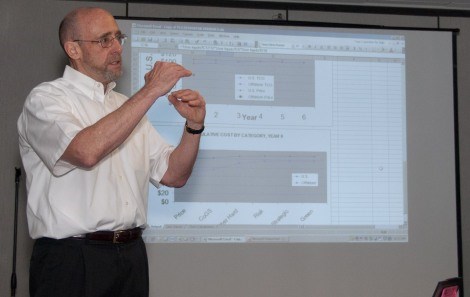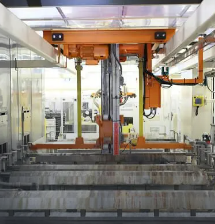Finishers can use free software to show that reshoring is about even to overseas
Finishing shops can show how keeping products in the U.S. is almost even to going overseas
#surfin

Featured Content
General Electric made headlines recently when it announced an investment program that will reverse a long-term offshoring trend and increase appliance manufacturing at its plants in Kentucky, Tennessee, Alabama, and Indiana. Among its reasons were rising costs for currency exchange, transportation, and labor in formerly cheap countries.
GE got attention because, well, it's GE, and $432-million in outlays by 2014 is no small deal. But the same kind of "total cost" calculations that helped get the giant manufacturer to move water-heater fabrication from China to America also applies to many, many other items, argues Harry Moser. He's the key player behind the Reshoring Initiative, a movement intended to reduce U.S. imports and regain manufacturing jobs.
Moser, who helped launch the Reshoring Initiative after retiring from AgieCharmilles's U.S. operation, reports that the effort is making progress, based on feedback from coverage in newspapers, magazines, and network television shows. Moser recently spoke at the NASF Sur/Fin show in Chicago, and also dropped by the home office of Products Finishing in Cincinnati to speak to editors, publishers and local manufacturing companies.
The Reshoring Initiative's main focus is to help a company track its true Total Cost of Ownership, which for component parts acquired overseas includes costs like special packaging, duties, brokers' fees, travel, rework, maintaining backup inventories, etc. The TCO calculation often as not demonstrates it's better to acquire components produced in America. You can get it by clicking HERE
The philosophy behind the Reshoring Initiative is to convince larger U.S. companies that sourcing parts domestically makes economic sense, more of a carrot than a stick approach. Some other efforts strive for alternate solutions. Witness the recommendations attached to a new AFL-CIO study that produced a database, Job Tracker, which fingers companies that have exported jobs overseas. In a report attached to the database, the union identifies remedies like addressing Chinese currency manipulation or changing taxation on U.S. companies with overseas plants.
Even as protectionist measures are examined in the face of stubborn high unemployment, the Reshoring Initiative's Harry Moser remains steadfast in his companies'-own-best-interest stance. He cites a 2009 survey by Archstone Consulting showing that manufacturers ignore 20% of the cost of offshoring. His mission: convince management to see the whole picture.
RELATED CONTENT
-
Drivers of Change
Is your metal finishing software ready for an upgrade?
-
Is Your Electroplating Waste Hazardous?
Some that bears precious metals is, and there are a host of regulations to consider when recycling.
-
Curing Oven Basics
Simply heating up the substrate does not cure the coating. There are many variables to consider when choosing the best cure oven for your application...


















